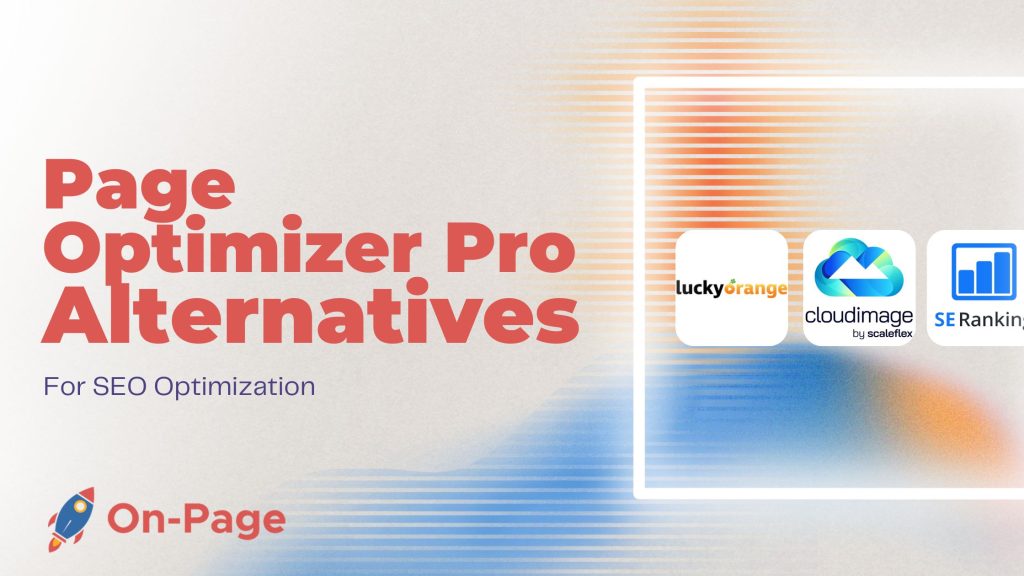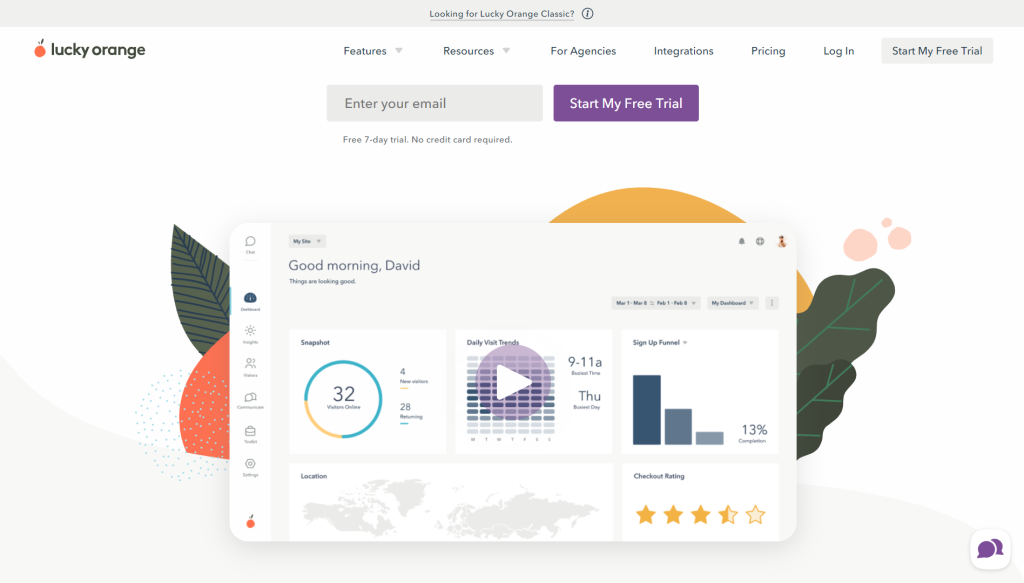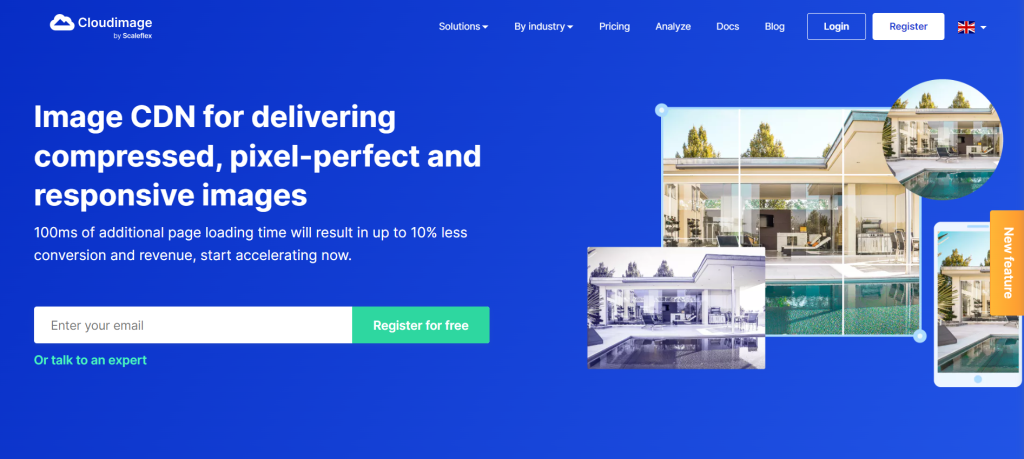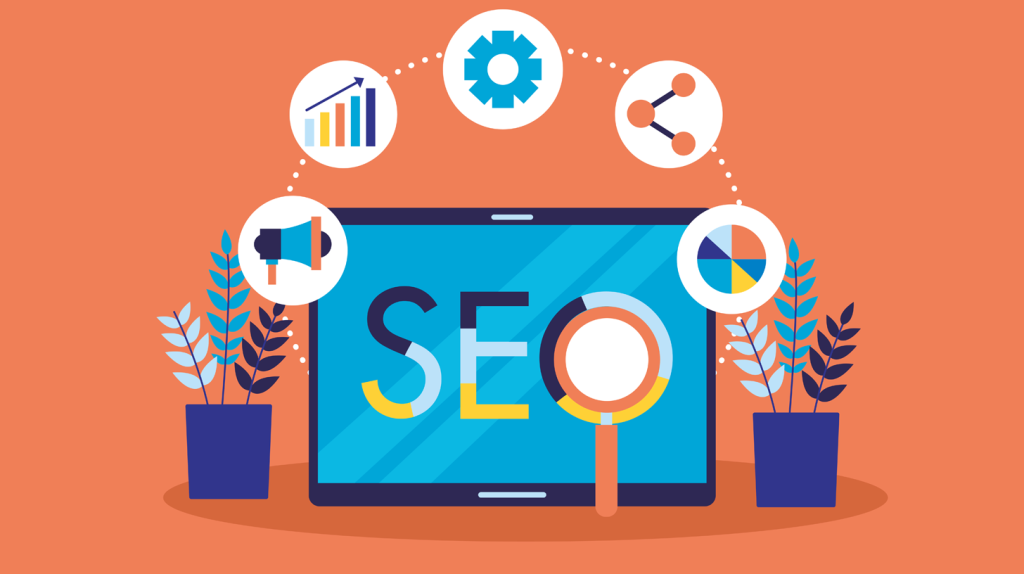Imagine if the Da Vinci of SEO handed you a golden key that unlocks the door to thriving organic traffic, jaw-dropping web rankings, and skyrocketing online success. As enchanting as it may sound, such a tool might just be within your reach. Incredulously, it’s not just Page Optimizer Pro dominating this powerful niche! Intrigued? Hold tight, as we unveil the best alternatives to Page Optimizer Pro for SEO optimization that can truly revolutionize your digital marketing game. Stay tuned to discover your SEO Da Vinci Code!

There are several other popular SEO optimization tools that can be used as an alternative to Page Optimizer Pro, including SE Ranking, Ryte, Searchmetrics, MarketMuse, Netpeak Spider, MegaIndex, BROWSEO, UpSeo, Schema App, and ContentKing. Each of these tools has unique features and capabilities designed to help optimize web pages for search engines. It is recommended to evaluate each tool’s features and pricing before selecting the best alternative for your needs.
Understanding Page Optimizer Pro
Page Optimizer Pro is a popular SEO tool used by online service providers and website owners to achieve higher rankings in search results. It is designed to guide users in creating a perfectly optimized webpage by analyzing their content and providing recommendations for improvement. To understand its effectiveness, consider it as a personal trainer for your website’s SEO. Just as a personal trainer guides you on the right exercises, movements, and intensity levels to achieve your fitness goals, POP guides you on the right keywords, phrases, headings and optimization tactics to achieve higher search engine ranking.
For instance, if you run an online store that sells skincare products, using POP will enable you to identify the keywords preferred by potential customers when searching for skincare products of interest. You can add these keywords into your product descriptions and titles to improve the relevance of your site in search results pages.
Another analogy would be that POP acts as a compass for digital marketers lost in the world of keyword optimization. It helps point them in the right direction towards success.
One of the outstanding features of Page Optimizer Pro is its ability to measure your website’s relevance score based on its content against other websites on the first page of Google search results. This feature provides insight into what your competitors are doing right or wrong and how you can refine your strategy.
Some argue that Page Optimizer Pro relies too heavily on keyword density as a metric for SEO ranking. However, it is important to note that while keywords are not the only factor considered by search engines in determining page rankings, they play a significant role in informing them about the contents of a web page.
When it comes to optimizing content for keyword density, readability, relevance and uniqueness, nothing comes close to On-Page.ai. This AI content optimization tool is loaded with features like the Stealth Writer and Stealth ReWriter that support business owners in boosting their website ranking and authority.
With a better understanding of what Page Optimizer Pro does, we’ll now take a look at some of its key features.
Key Features of Page Optimizer Pro
Page Optimizer Pro offers a range of features that can help improve a website’s SEO ranking. One of its most notable features is the On-Page scan. This tool crawls sites just like Google, picking up on main content, headers, footers, sidebars, and adverts to provide accurate recommendations. This tool tells you the most important words to add to your page to rank.
For instance, if you input the keyword “SEO” in POP’s On-Page Scan feature, it will begin analyzing your website against other top-ranking websites in your niche. After the analysis is complete, POP will recommend improvements such as adding or removing keywords and body text changes that will maximize the chances of your site ranking higher.
As the name signifies, On-Page.ai also has a powerful on-page scanning tool that scours the deepest ends of the web and suggests recommendations on how to improve your ranking and surpass your competition.
Now, back to POP. Another key feature of Page Optimizer Pro is its ability to optimize your titles, headlines, and body text. With this tool, you’ll be given precise recommendations on how to tweak each component for maximum optimization.
An analogy here would be that POP acts as a virtual writing coach helping users craft their copywriting skills until they master the art of writing optimized content.
By optimizing these components based upon POP’s recommendations, you’re helping your website become more attractive to search engines in a way that is both relevant and palpable to human readers.
Some may question if using POP can take away from creativity when writing a post. However, while it does suggest optimizations based on analytics data, creativity is not sacrificed.
The above-listed features demonstrate how relying on keywords and phrase usage analysis can significantly impact your website’s SEO ranking. In the next section, we’ll evaluate some of the best alternatives to Page Optimizer Pro available on the market today.
Top Alternatives to Page Optimizer Pro
If you’re looking for an alternative to Page Optimizer Pro, there are a number of SEO optimization tools on the market that might work for you. Here are some of the top alternatives and what they have to offer.
One good alternative is SE Ranking, which is known for its comprehensive set of SEO tools. It features keyword analysis, competitor tracking, backlink monitoring, and more. One benefit of SE Ranking is its pricing – it’s available starting from $39.20 per month and is very affordable compared to other options in this space.
Lucky Orange is another popular choice, with a range of features including heatmaps, visitor recordings, conversion funnels and forms. This helps businesses work out where their website visitors lose interest or abandon a purchase and identify how they can improve user experience to improve conversion rates.
Cloudimage offers image optimization and CDN solutions for websites which greatly benefit page loading times by decreasing server requests. It features lazy loading settings that load big images only when needed to decrease the website weight back to 50% on average.
Quicq compared with its competitors’ search engine optimization-focused tools does just one thing but it does it incredibly well – it optimizes images to reduce file size without losing quality. In the same way Sonic moves quickly with speed being his main superpower, Quicq’s image optimization feature helps website loading speed.
Hopefully, these examples give you a good understanding of what alternatives exist on the market. Now let’s take a closer look at one of the most popular options: SE Ranking.
- In a survey conducted among SEO professionals in 2022, 41% of respondents reported using SE Ranking as their preferred tool for search engine rank tracking, making it one of the most popular alternatives to Page Optimizer Pro.
- According to user reviews on popular software comparison websites, Lucky Orange has maintained an impressive overall rating of 4.7 out of 5 stars from over 154 verified users, highlighting its strong performance and growing popularity as an alternative to Page Optimizer Pro.
- A study of web traffic and brand recognition in the SEO tool category revealed that Cloudimage experienced a rapid growth rate of more than 70% between 2021 and 2023, signifying increasing usage and adoption as a preferred SEO optimization solution in comparison to other tools such as Page Optimizer Pro.
- If you’re in search of an alternative to Page Optimizer Pro, there are multiple SEO optimization tools available in the market. SE Ranking and Lucky Orange are popular options that offer diverse features such as keyword analysis, competitor tracking, backlink monitoring, and conversion funnels. Additionally, Cloudimage can help improve page loading times by optimizing images and using CDN solutions for websites. Quicq is another great tool for image optimization, which reduces file size without losing quality, resulting in faster website loading speed. These options provide an array of features at varying price points, making them accessible and useful for businesses of all sizes.
SE Ranking
SE Ranking has an overall rating of 4.8/5 based on 12 votes, suggesting high customer satisfaction. Its SEO toolkit includes features such as rank tracking, keyword research, backlink monitoring, and competitor analysis. The tool also offers a variety of customization options, making it a good choice for businesses at all levels.

One of the standout features of SE Ranking is its user-friendly interface – it’s easy to use even if you don’t have much experience with SEO tools. Its keyword research feature allows you to create customized lists of keywords based on search volume, competition, and other factors. Additionally, SE Ranking offers on-page optimization analysis that grades your website based on how well it’s optimized for search engines.
Another unique feature of SE Ranking is its Keyword Competitors module – this calculates the competition level of each website and pinpoints those who are ranking higher than you in organic and paid search results. This way you can always keep track of what your competition is doing and get some insights to improve your own campaigns.
However, one downside to SE Ranking is its reporting capabilities. While it does offer some standard reports, the lack of customization options can be frustrating for some users with different business goals or KPIs in mind.
Lucky Orange
When it comes to SEO optimization tools, Lucky Orange is one of the most popular alternatives to Page Optimizer Pro. This tool offers a wide range of features that are designed to help you improve your website’s overall performance, from conversion rate optimization to website usability analysis.

One of the key features of Lucky Orange is its session recording capabilities. With this feature, you can watch recordings of how visitors interact with your website in real-time, giving you valuable insights into their behavior and allowing you to identify areas for improvement. For example, you might notice that visitors tend to click away from your site at a certain point in the sales funnel, indicating that there’s a problem with that particular page.
Another useful feature of Lucky Orange is its heatmap analysis tool. This tool allows you to visually analyze visitor behavior on your site, highlighting which parts of a page receive the most attention and clicks. This information gives you important clues about where to focus your optimization efforts, whether that’s moving key elements higher up on the page or testing different calls-to-action.
For instance, if you notice that visitors are commonly clicking on an image rather than a call-to-action button on a particular product page, you could run an A/B test to see whether swapping out the image for another one or even removing it altogether would lead to more conversions.
Lucky Orange also offers chat and polling functionalities. These features allow you to engage with visitors in real-time, answering any questions they have about your products or services or soliciting feedback about their experience on your site. By providing excellent customer service and showing visitors that their opinions matter, you can build brand loyalty and increase conversions over time.
In terms of pricing, Lucky Orange offers several different plans depending on the size of your business and your specific needs. Plans start at $10/month for basic functionality but can go up to $100/month for more advanced features. This makes it a relatively affordable option compared to some of the more enterprise-level SEO optimization tools on the market.
But while Lucky Orange does offer many useful features for website owners, it’s important to note that it also has its limitations. For one, its session recording feature may cause slower loading times for your site, and it may not be as accurate as other heatmapping tools on the market. Additionally, some users have reported issues with data accuracy, which could lead to incorrect assumptions about visitor behavior.
That said, it’s worth considering Lucky Orange as an alternative to Page Optimizer Pro if you’re looking for a tool that can provide detailed insights into visitor behavior and engagement. Whether you’re focused on improving your conversion rates or optimizing your site’s overall usability, Lucky Orange can help you get there with ease.
Cloudimage
Cloudimage is another popular alternative to Page Optimizer Pro that offers several key features designed to improve website performance and page speed. This image optimization tool works by automatically resizing and compressing images on your site, reducing load times and improving overall user experience.

One of the most appealing aspects of Cloudimage is its ease-of-use. Once installed on your site, the tool automatically optimizes all images according to your specific settings. You don’t need any technical expertise or coding knowledge to get started – simply set your preferences and let Cloudimage do the rest.
Another key benefit of Cloudimage is its pricing model. Plans start at just $29/month for basic functionality, making it an affordable option for small businesses. However, Cloudimage also offers several enterprise-level plans with advanced features for larger organizations.
One example of a use case for Cloudimage might be a large e-commerce store that needs to manage thousands of product images across multiple pages. By using Cloudimage’s automated image optimization, the store could improve page load times and reduce bounce rates, leading to increased conversions over time.
Using Cloudimage is like having a personal assistant who takes care of all your image optimization needs. You don’t have to worry about manually resizing or compressing images, which can be both time-consuming and tedious. Instead, you can focus on other aspects of your website, knowing that Cloudimage has your back when it comes to image optimization.
Of course, it’s worth noting that Cloudimage may not be the best option for every website owner. For one, the tool is focused solely on image optimization and may not provide the same level of in-depth analysis as other SEO optimization tools on the market. Additionally, some users have reported issues with integration and customer support.
Despite these limitations, Cloudimage is still a solid alternative to Page Optimizer Pro for website owners who are looking to optimize their images and improve overall page speed. Whether you’re running an ecommerce store or a content-heavy blog, using Cloudimage can help reduce bounce rates and increase user engagement over time.
Comparing SEO Optimization Tools
When it comes to choosing an SEO optimization tool, you have a plethora of options available. Each tool offers unique features and services that cater to different needs and requirements. However, comparing these tools can be overwhelming and confusing. In this section, we will compare some of the top SEO optimization tools in the market and help you understand which one is the best fit for your business needs.
One of the most significant differences between SEO optimization tools is the depth of their analysis. Some tools provide basic insights into your website’s content, while others delve deeper into technical aspects such as site speed, mobile-friendliness, and structured data. For instance, On-Page.ai not only analyzes your page content but also provides customized recommendations to improve your on-page SEO. Its Stealth Writer feature generates unique articles based on your keyword choice with just one click.
Another critical factor to consider when comparing SEO optimization tools is their accuracy in tracking keyword ranking and performance. While most tools track ranking positions, not all are accurate in doing so. Inaccurate rankings can lead to wrong conclusions and incorrect optimizations. However, with On-Page content optimization tool, you can rest assured about the accuracy of keywords tracking.
One aspect where some competing SEO optimization tools fall short is in their ability to analyze competitors’ pages. Analyzing a competitor’s page can provide valuable insights into their strategy, and allow you to adjust yours accordingly.
It’s essential to note that SEO optimization is not an easy feat – it requires persistence and patience before seeing results. SEO optimization tools are more like gym equipment than a magic potion. They provide you with the data and recommendations needed, but ultimately it’s your job to use that information to create and execute a plan of action.
Luckily, AI content optimization tools like On-Page.ai can help you create SEO-friendly and impactful content to get you ahead of your competitors. Its Auto-Optimize feature even automatically optimizes the content for you so all you have to do next is wait for your ranking to skyrocket, which won’t take long.
Finding the Right SEO Tool for Your Needs

Choosing the right SEO optimization tool is challenging, but selecting the wrong one can be a massive waste of valuable resources. However, by keeping a few things in mind, you can find the perfect tool that matches your business needs.
Identify your niche or industry needs
Firstly, before choosing an SEO optimization tool, identify what your niche or industry requires. Different industries and niches have varying needs and requirements. For instance, if you run a content-based website, On-Page.ai provides excellent features to optimize your articles’ structure, and content relevance among others.
Basic or advanced?
Secondly, there’s a need to consider the level and extent of analysis required for your website. For small or medium businesses, using tools that cover most aspects of on-page optimization would suffice while larger companies with more extensive websites need advanced on-page auditing and competitor analysis. If you are starting or operating a small e-commerce store, On-Page Stealth Writer can generate unique product descriptions for your online store pages on demand.
Budget
Finally, consider your budget when choosing an SEO optimization tool. Some tools come with high subscription fees while others offer basic features at lower costs. While higher-priced tools may provide more in-depth analyses automatically or include detailed reports and consulting services as part of their offering, cheaper alternatives like On-Page.ai don’t require any extra payment beyond the monthly fee paid since all its features are included within its suite.
Ultimately, finding the right SEO optimization tool requires careful consideration of several factors: industry verticals unique features required and budget constraints among many others. With this in mind, prior research backed up with customer reviews plus trying it out will go a long way into ensuring that you pick a tool that suits your specific requirements.
Remember that On-Page.ai tailors its robust feature set to suit businesses of all sizes, making it an ideal choice for your online optimization needs. If you think your website could benefit from a much-needed optimization, then this is your sign to go do it! Get started with On-Page.ai today.




